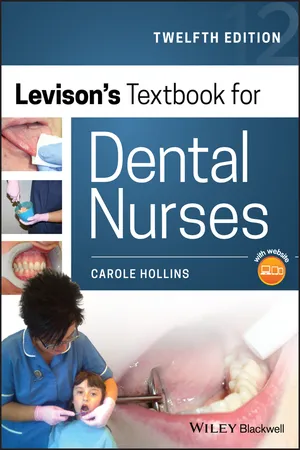
- English
- ePUB (mobile friendly)
- Available on iOS & Android
Levison's Textbook for Dental Nurses
About this book
A fully updated edition of the best-selling textbook for students studying for their dental nurse qualification
Levison's Textbook for Dental Nurses continues to be an indispensable resource written specifically for those undertaking the NEBDN National Diploma in Dental Nursing. This new edition provides in-depth coverage in many areas, such as the structure of the dental profession; an update of the current, available NHS dental services; information on extended duties for dental nurses; legal and ethical issues; health and safety including COSHH and waste disposal legislation updates; general anatomy and physiology; and medical emergencies.
- New edition of a classic textbook, fully in line with the most recent developments in dental nursing practice and education
- Caters especially for the NEBDN National Diploma in Dental Nursing
- Outlines the latest GDC standards for dental nurses
- Key Learning Points in every chapter to help readers master essential information
Packed with illustrations and diagrams to assist with aiding comprehension, this student-friendly text is ideal for dental nurses studying for the NEBDN National Diploma in Dental Nursing. It will also be of great benefit to dental nurses studying for the City & Guilds Diploma in Dental Nursing, Level 3.
Tools to learn more effectively

Saving Books

Keyword Search

Annotating Text

Listen to it instead
Information
1
Structure of the Dental Profession
Key learning points
- the various members that make up the dental team
- the key roles of each member as well as the dental nurse
- the National Health Service and its current involvement with the provision of dental care
The dentist
- General practice.
- Community dental service.
- Hospital service.
- University teaching and research.
- Industrial dental service.
- The armed forces.
- Fellowship in Dental Surgery (FDS).
- Master of Science (MSc) in a specialty.
- Membership in the Joint Dental Faculties (MJDF).
- Membership in Paediatric Dentistry (M Paed Dent).
- Membership of the Faculty of Dental Surgery (MFDS).
- Diploma in Dental Public Health (DDPH).
- Diploma in Dental Radiology (DDR).
- Diploma in General Dental Practice (DGDP).
- Diploma in Orthodontics (DOrth).
- Oral and maxillofacial surgery.
- Surgical dentistry.
- Dental and maxillofacial radiology.
- Dental public health.
- Oral medicine.
- Oral microbiology.
- Oral pathology.
- Orthodontics.
- Periodontics.
- Prosthodontics.
- Restorative dentistry.
The General Dental Council
- Quality‐assuring education programmes for dental professionals: to ensure that the education and training delivered is sufficient to cover all the necessary learning outcomes for each category of dental professional.
- Registering dental professionals so that they may work in the UK: to ensure that only those with suitable dental qualifications are providing care to patients.
- Setting standards that all dental professionals must meet: to ensure that all dental professionals work at or above a defined level of professionalism at all times.
- Requiring all dental professionals to maintain and update their skills through continuing professional development (CPD): to ensure that all dental professionals are up to date with the latest knowledge and skills throughout their working career.
Table of contents
- Cover
- Table of Contents
- Introduction to the Twelfth Edition
- Introduction to the First Edition
- Acknowledgements
- Abbreviations
- About the Companion Website
- 1 Structure of the Dental Profession
- 2 The Dental Nurse
- 3 Legal and Ethical Issues
- 4 Health and Safety in the Dental Workplace
- 5 General Anatomy and Physiology
- 6 Medical Emergencies
- 7 Microbiology and Pathology
- 8 Infection Control and Cleanliness
- 9 Head and Neck Anatomy and Physiology
- 10 Oral Anatomy and Physiology
- 11 Oral Disease
- 12 Oral Health Assessment and Diagnosis
- 13 Oral Health Promotion and Disease Prevention
- 14 Pain and Anxiety Control
- 15 Restorative Dentistry
- 16 Prosthodontics
- 17 Extractions and Minor Oral Surgery
- 18 Extended Duties of the Dental Nurse
- Index
- End User License Agreement
Frequently asked questions
- Essential is ideal for learners and professionals who enjoy exploring a wide range of subjects. Access the Essential Library with 800,000+ trusted titles and best-sellers across business, personal growth, and the humanities. Includes unlimited reading time and Standard Read Aloud voice.
- Complete: Perfect for advanced learners and researchers needing full, unrestricted access. Unlock 1.4M+ books across hundreds of subjects, including academic and specialized titles. The Complete Plan also includes advanced features like Premium Read Aloud and Research Assistant.
Please note we cannot support devices running on iOS 13 and Android 7 or earlier. Learn more about using the app